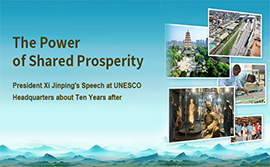

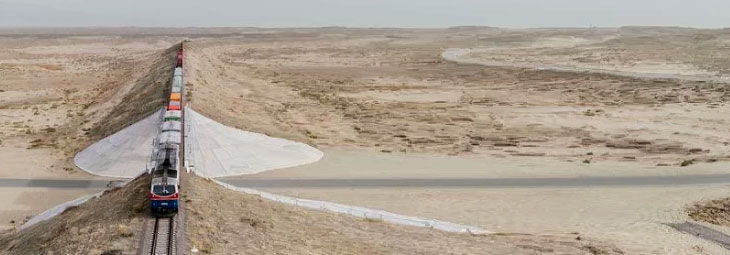
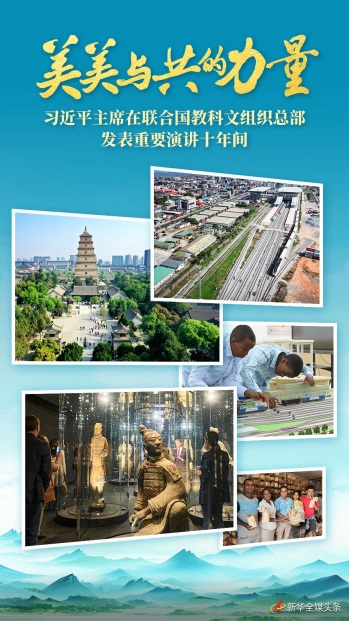
Ten years ago, on 27 March, the conference hall at UNESCO Headquarters was filled to capacity.
"We should promote mutual respect and harmonious coexistence among different civilizations, making exchanges and mutual learning between civilizations a bridge to enhance friendship among peoples of all countries, a driving force for the progress of human society, and a bond for safeguarding world peace." President Xi Jinping has profoundly expounded China's view on civilization and put forward the important proposition of exchanges and mutual learning among civilizations from the perspective of the progress of human civilization and the development of world peace.
Ten years later, today, the world is witnessing new patterns and trends, as well as encountering new risks and challenges. Human society stands at a crossroads of history. China's perspective on civilization is consolidating more consensus and evoking more resonance, continuously contributing Chinese wisdom to the advancement and progress of human civilization."
"That was a historic speech, the significance of which is even more evident today," remarked Irina Bokova, who was the Director-General of UNESCO at the time and present during the address. " Today we are presenting different cultures, religions, ethnic groups between the part of an intertwined community of shared destiny "
"Promoting mutual understanding, peace, and friendship."
At the entrance of the ancient Mayan city of Copan in northwestern Honduras stands an exquisite dragon head sculpture, featuring a prominent round nose and curled whiskers resembling the Chinese dragon. Adjacent to the sculpture, a plaque bears the names of two archaeological partners: Li Xinwei and Ramos.
As co-leaders of a joint archaeological project between China and Honduras, both individuals share many common understandings regarding civilization. Li Xinwei believes that studying civilization must possess an international perspective, with China's view of civilization grounded in equality and opens to the world. Ramos, on the other hand, sees differences in the Honduras and Chinese civilizations, as well as distinct archaeological methods, but emphasizes that consensus can always be achieved through collaboration.
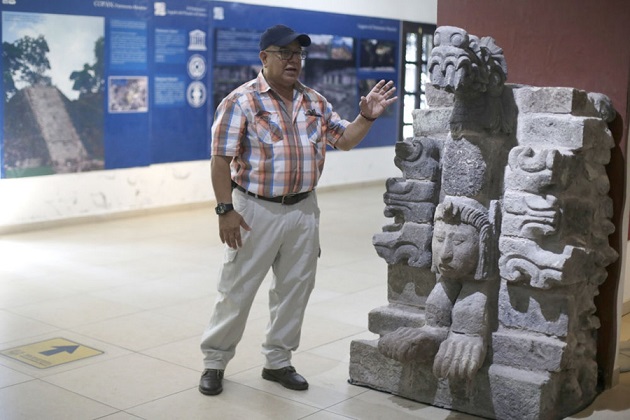
"On June 8, 2023, at the display hall entrance of the Copan Ruins in Honduras, Salvador Martinez, representing the Western Region of the Honduran Institute of Anthropology and History, introduces the dragon head sculpture discovered by the joint archaeological team. [Photo by Lucio Tavolaro/Xinhua]
"Civilization is diverse; it is through this diversity that human civilization finds value in exchange and mutual learning." "Civilization is founded on equality; it is through this equality that human civilization establishes the premise for exchange and mutual learning." "Civilization is inclusive; it is through this inclusivity that human civilization gains momentum for exchange and mutual learning."
——Ten years ago, in a speech at the headquarters of UNESCO, President Xi Jinping elucidated the significance of civilization in this manner.
Over the past decade, President Xi Jinping has personally spearheaded the promotion of cultural exchanges and mutual learning as a bridge to enhance friendship among peoples of all countries. At a welcoming banquet hosted by a coalition of American friendly organizations, he urged the people of China and the United States to engage in more frequent interactions and exchanges. In a reply letter to students from a bilingual school in Hungary, he encouraged them to deepen their understanding of contemporary China and its historical culture, striving to become messengers in promoting the continuous development of Sino-Hungarian friendship. He congratulated the establishment of the China-Greece Center for Civilizational Exchange, emphasizing the importance of a thorough understanding and appreciation of the ancient origins and rich content of various civilizations. Together with the international community, China endeavors to forge a new landscape of humanistic exchanges, cultural integration, and mutual understanding among peoples worldwide.
As noted by British international relations expert Keith Bennett, advancing cultural exchanges and mutual learning on multiple levels "will not only promote the development of science and knowledge, but also foster mutual understanding, peace, and friendship."
This spring, within the global garden of civilizations, more seeds of friendship are being sown.
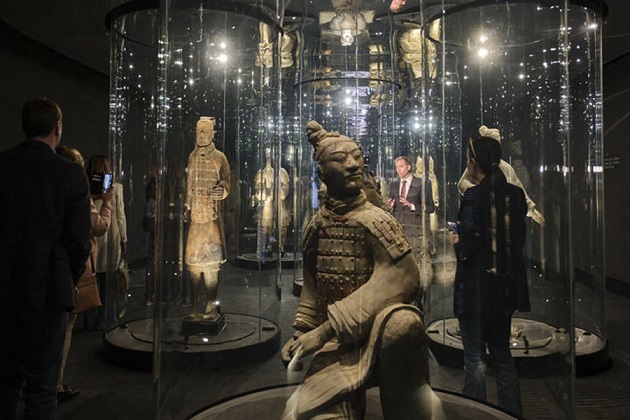
On March 28, 2023, visitors explore the "Heritage of Chinese Qin and Han Civilizations" exhibition in Alicante, Spain. [Photo by Meng Dingbo/Xinhua]
At the Archaeological Museum of Alicante in Spain, the Terracotta Warriors make an appearance in the exhibition "Heritage of Chinese Qin and Han Civilizations," offering another window for overseas audiences to explore Chinese culture. According to Qian Jikui, Deputy Director of the Shaanxi Provincial Cultural Relics Bureau, the Terracotta Warriors are among the most popular artifacts from Shaanxi, having been exhibited in countries such as Peru, the United Kingdom, and Thailand in recent years, attracting a cumulative total of over a million visitors. This has deepened the understanding and friendship between China and people from various countries.
In France's Palace of Versailles, over 70 pieces of art treasures have just been carefully packaged and shipped to Beijing, where they will be exhibited at the upcoming "Versailles Palace and the Forbidden City" exhibition at the Palace Museum. This marks a significant event in the China-France Cultural Tourism Year, with the curatorial team meticulously selecting exhibits to showcase the extensive historical exchanges between the two countries in areas such as science, diplomacy, and artistic creation. Marie Laure de Rochebrune, curator from the French side and head of the Department of Artifacts at the Palace of Versailles, told reporters, "This is a grand celebration of civilization that goes both ways."
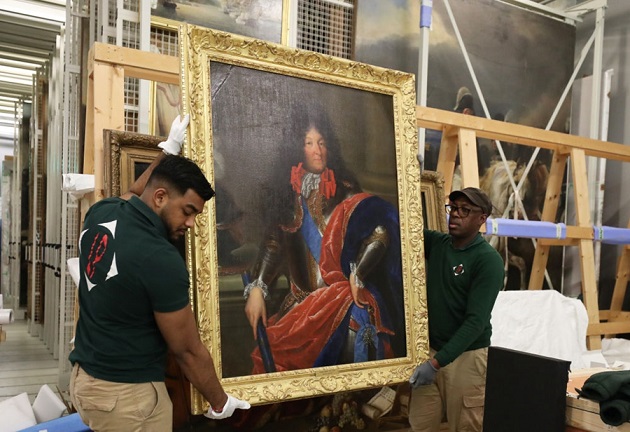
On March 11, 2024, at the Palace of Versailles near Paris, France, staff members are preparing to package the oil painting "Portrait of Louis XIV in Armor." On the occasion of the 60th anniversary of the establishment of diplomatic relations between China and France and the China-France Cultural Tourism Year in 2024, the Palace of Versailles and the Palace Museum will jointly host the "Versailles Palace and the Forbidden City" exhibition from April to June at the Palace Museum in Beijing. Over 70 exhibits from the French side will be packed and shipped to Beijing by staff members of the Palace of Versailles in the near future. [Photo by Gao Jing/Xinhua]
Upholding a civilizational perspective grounded in principles of equality, mutual learning, dialogue, and inclusivity, China has proposed and implemented the Global Civilization Initiative. Through ongoing cultural exchanges with various regions worldwide, China has continuously enriched its interactions in the humanities. Chinese and foreign partners, through these exchanges, have come to understand and appreciate each other, thus fostering a closer bond between their hearts and minds.
The "New Silk Road" is also a "Cultural Silk Road".
In Uganda, East Africa, 45-year-old trainer Martin Okoed is bridging gaps in medical services in certain regions by imparting basic healthcare knowledge through remote education models. Okoied, a recipient of the Great Wall Scholarship jointly established by the Chinese government and UNESCO in 2018, pursued studies in Information and Communication Technology at East China Normal University in Shanghai. He remarked to reporters that this talent cultivation project for developing countries "will impact future generations.
Asenath Maobe, a lecturer at Kenyatta University in Kenya, is also a recipient of the Great Wall Scholarship. During her studies in China in 2019, she engaged in community work in Shanghai and witnessed poverty alleviation efforts in rural areas of Shandong, learning grassroots governance experiences. She noted that fellow recipients of the Great Wall Scholarship from countries like Ethiopia, Namibia, and Tanzania are employed in various fields such as infrastructure development and industrialization. They unanimously agree that their learning experiences in China have been beneficial for their involvement in their own country's development.
President Xi Jinping announced at the headquarters of UNESCO that the number of Great Wall Scholarship slots would be increased from 25 to 75 annually. This scholarship program, targeting developing countries, has been hailed by UN officials as a model supporting "South-South Cooperation."

On May 11, 2022, in Nadi, the third-largest city in Fiji, employees of a Fijian mushroom company showcase mushrooms grown with the assistance of the China-aided Fungi Cultivation Technology Demonstration Center project. [Photo by Yongxing/Xinhua]
China engages with the world in mutual exchange and learning of diverse civilizations, collaborating to share development opportunities and successful experiences. Through cultural exchanges and mutual learning, China promotes human development and works together to create a better future.
Yue Du, Secretary-General of the United Nations Educational, Scientific and Cultural Organization Association World Federation, remarked that China's advocacy for human-centered development, promoting social development through education, skills, and technological advancement, aligns well with the principles of UNESCO.
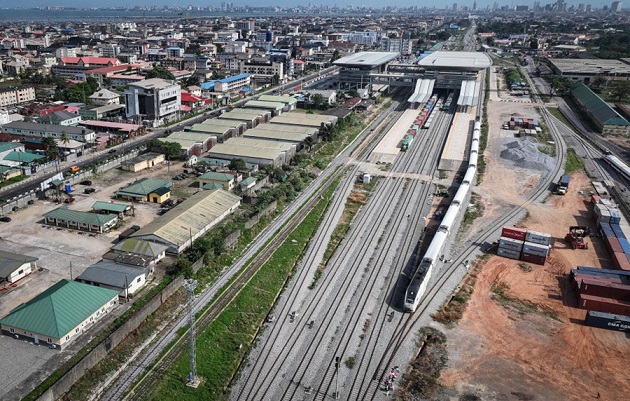
On March 2, 2024, in Lagos, Nigeria, a train departs from the Mobolaji Johnson Railway Station on the Lagos-Ibadan railway line (drone photo). In June 2021, under the guidance of the jointly constructed "Belt and Road" initiative, the Lagos-Ibadan railway, constructed by China Civil Engineering Construction Corporation (CCECC), was officially opened for operation. The mainline is approximately 157 kilometers long, with a branch line of about 7 kilometers, built to modern railway standards with a design speed of 150 kilometers per hour. [Photo by Han XuXinhua]
Zhang Qian's missions to the Western Regions opened up cultural exchanges and trade between China and Central Asia as well as Western Asia; during the Tang Dynasty, envoys, merchants, and students gathered in the capital city of Chang'an; Admiral Zheng He's seven voyages to the Western Seas left behind tales of friendly exchanges between China and the peoples of the countries along the way... In a speech ten years ago, President Xi Jinping eloquently recounted the grand history of interaction between Chinese civilization and world civilizations along the ancient Silk Road.
President Xi Jinping's depiction of the flourishing scenes along the ancient Silk Road connecting the East and the West left a deep impression on Bokova. "It has been in the past, the Silk Road was a route of trade and economic exchange, but also knowledge exchange link of cultural exchange."
Bokova attended the Third Belt and Road Forum for International Cooperation in China last year, gaining a deeper understanding of the tangible achievements of China's cooperation with the world in building the Belt and Road Initiative. The promotion of hybrid rice and mushroom cultivation techniques, the construction and opening of multiple railway lines and freight trains, and the establishment of vocational workshops and various education and training projects have all contributed to the success. Over the past decade, Belt and Road cooperation has created 420,000 job opportunities in partner countries, benefiting the development and livelihoods of an increasing number of countries and regions.
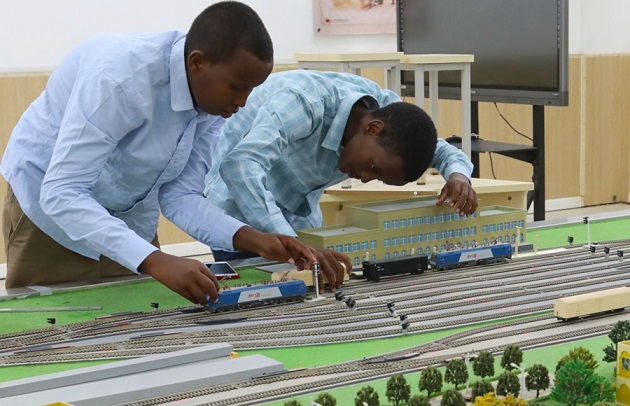
On September 19, 2022, at the Djibouti Business School in Djibouti City, the capital of Djibouti, students are engaged in learning at the Railway Operation Sandbox Teaching Area of the Luban Workshop. [Photo by Dong Jianghui/ Xinhua]
Bokova believes that this "New Silk Road" is also a "Cultural Silk Road." In June 2014, the "Silk Roads: the Routes Network of Chang'an-Tianshan Corridor" project jointly proposed by China, Kazakhstan, and Kyrgyzstan was successfully inscribed on the World Heritage List. According to Bokova, this joint application for World Heritage status is another contribution by China to the protection of civilization and coordinated development. At the China-Central Asia Summit in May 2023, President Xi Jinping reached a series of consensus with the heads of state of the five Central Asian countries, including continuing to consolidate cultural, tourism, and other humanities cooperation. China also invited the five Central Asian countries to participate in the implementation of the "Cultural Silk Road" plan to promote people-to-people connectivity.
"The culture and civilization dimension is very high on agenda," Bokova said. "Only by deepening exchanges among different civilizations can humanity achieve the prosperity and development of culture, technology, and knowledge."
" None of the words aged today "
Another featured event of the China-France Culture and Tourism Year, the "Encounter with Napoleon" exhibition, is set to take place in Beijing. Among the exhibits is a woolen silk tapestry depicting a scene where Napoleon, after a crucial battle, awards an honor sword to his guard.
Napoleon once wielded his sword in conquest but ultimately met his downfall at Waterloo. In a dialogue with the French poet Fontaine, he acknowledged: "There are only two forces in the world, the sword and the spirit. In the long run,the sword will always be conquered by the spirit."
Ten years ago, at the headquarters of UNESCO, President Xi Jinping quoted Napoleon's words and pointed out that through cross-border, cross-temporal, and cross-civilizational educational, scientific, and cultural activities, the seeds of peace should take root and sprout in the hearts of people worldwide, fostering a proliferation of peaceful forests on this planet we share.
Currently, the world peace is still shrouded in gloom, with the Ukraine crisis lingering, the situation in the Middle East suddenly escalating, and terrorist attacks leading to tragedies. Looking deeper, the old ideologies of hegemonism, power politics, and zero-sum games refuse to fade away, and the instigation of a new round of "clash of civilizations" is becoming a pretext and tool for schemers. "
"None of the words that President Xi pronounced aged today, it is still more relevant. Because the problems we confirmed nowadays, are misunderstandings and lack of cooperation among member states. " Bokova remarked. "the way that President Xi focused on the culture and cultural dialogue diversity is very important "
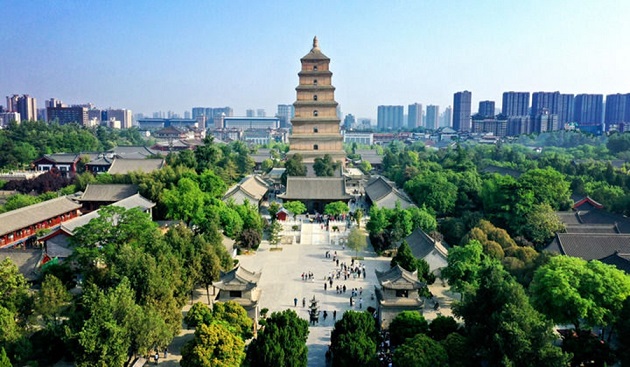
This is a drone photo of the Giant Wild Goose Pagoda in Xi'an, taken on April 19, 2023. In June 2014, the "Silk Roads: the Routes Network of Chang'an-Tianshan Corridor," jointly proposed by China, Kazakhstan, and Kyrgyzstan, was successfully inscribed on the World Heritage List, becoming the first Silk Road project to be successfully inscribed on the World Heritage List through joint application, and the first project among the 54 corridors of the Silk Road designated by UNESCO to successfully apply for World Heritage status. [Photo by Liu Xiao/Xinhua]
The power of civilization is the power that upholds peace, combining both gentleness and strength. Whether conducting diplomacy at home or visiting abroad, from bilateral discussions to multilateral conferences, President Xi Jinping has reiterated the significance of civilization exchanges and mutual learning on numerous occasions: "We must not be arrogant or belittle other civilizations and ethnicities," "All civilizations inherently lack conflicts; what is needed is an eye that appreciates the beauty of all civilizations," "Believing that one's own race and civilization are superior, and insisting on transforming or even replacing other civilizations, is foolish in understanding and disastrous in practice
Volker Tschapke, Honorary Chairman of the Prussian Association in Berlin, Germany, believes that President Xi Jinping's exposition of China's view on civilization helps to eliminate conflicts between nations. This civilization, which advocates "sitting down for equal consultations," stands in stark contrast to the value system of "might is right."
From facilitating the restoration of diplomatic relations between Saudi Arabia and Iran, to shuttling diplomacy amidst the Ukrainian crisis, and tirelessly striving for a ceasefire between Israel and Palestine... China calls for conflict resolution, works for peace, and continuously contributes Chinese proposals and Chinese strength to achieve lasting peace and stability in the world.
According to Sheikh Ndiaye, former editor-in-chief of the Senegal News Agency, China's proposal and practice of a global civilization initiative effectively promote exchanges and understanding between different civilizations. This deepens mutual understanding, reduces misconceptions and prejudices, and brings new ideological and political foundations for the coexistence and tolerance of different cultures.
Civilization, like water, nurtures silently. With an attitude of inclusiveness, China absorbs the achievements of human civilization and promotes cultural exchanges and mutual learning with confidence and openness. Xi Jinping's cultural ideology injects spiritual strength into the Chinese-style modernization and provides wisdom and enlightenment for addressing common human challenges. China will continue to advocate for peaceful coexistence and harmonious cohabitation among different civilizations, promote the creative development of human civilization, foster mutual understanding and affection among peoples of all countries, and inject profound and enduring cultural and civilizational strength into the construction of a community with a shared future for humanity.
Text Reporters: Zhang Yuan, Zhang Dalei, Xu Yongchun, Wu Hao, Yang Yimiao, Zhang Baihui, Li Hualing, Wang Xuchen, Nie Zugu
Poster Design: Yin Zhelun
Editors: Qiao Jihong, Chen Shan, Sun Hao, Ding Ying, Lin Xiaochun, Wang Yujue, Wang Fengfeng, Wang Haiyan, Shan Yuqi, Gong Bing, Yang Guang, Jiang Ziwei, Wu Jinfu
Overall Coordination: He Yuxin, Huang Xiaoxi
Editor: Cai Ronghan
Source: <https://www.yidaiyilu.gov.cn/p/0FBDFFFI.html>
Translated by Chen Xiao